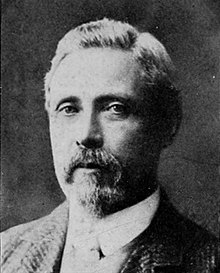
Back وليام ميتشل رامزي Arabic وليام ميتشل رامزى ARZ William Mitchell Ramsay German William Mitchell Ramsay Spanish William Mitchell Ramsay French Ուիլյամ Միտչել Ռամզի Armenian William Mitchell Ramsay ID William M. Ramsay Italian William Mitchell Ramsay Polish William Mitchell Ramsay Portuguese

Sir William Mitchell Ramsay FBA (15 March 1851 – 20 April 1939) was a British archaeologist and New Testament scholar. He was the foremost authority of his day on the history of Asia Minor, and a leading scholar in the study of the New Testament.[1]
Ramsay was educated in the Tübingen school of thought (founded by F. C. Baur)[1] which doubted the reliability of the New Testament, but his extensive archaeological and historical studies convinced him of its historical accuracy.[2] From the post of Professor of Classical Art and Architecture at Oxford, he was appointed Regius Professor of Humanity at Aberdeen.[3]
Knighted in 1906 to mark his distinguished service to the world of scholarship, Ramsay also gained three honorary fellowships from Oxford colleges, nine honorary doctorates from British, Continental and North American universities, and became an honorary member of almost every association devoted to archaeology and historical research.
At the end of his career he became involved in Christian apologetics, which combined with his argumentative and caustic tendencies ultimately harmed his reputation among scholars.[1][4]
- ^ a b c Gasque, W. Ward; Bruce, F. F. (1966). "Sir William M. Ramsay: Archaeologist and New Testament Scholar, A Survey of His Contribution to the Study of the New Testament" (PDF). Baker Studies in Biblical Archaeology.
- ^ See Ramsay, W.M. (1904). St. Paul the Traveller and the Roman Citizen. Putnam and Sons. p. 8. where he states, "I may fairly claim to have entered on this investigation without any prejudice in favour of the conclusion which I shall now attempt to justify to the reader [i.e., the reliability of the book of Acts]. On the contrary, I began with a mind unfavourable to it, for the ingenuity and apparent completeness of the Tübingen theory had at one time quite convinced me. It did not lie then in my line of life to investigate the subject minutely; but more recently I found myself often brought in contact with the book of Acts as an authority for the topography, antiquities, and society of Asia Minor. It was gradually borne in upon me that in various details the narrative showed marvellous truth. In fact, beginning with the fixed idea that the work was essentially a second-century composition, and never relying on its evidence as trustworthy for first-century conditions, I gradually came to find it a useful ally in some obscure and difficult investigations."
- ^ W.M. Ramsay: British archaeologist and New Testament scholar, Christian Classics Ethereal Library
- ^ Hemer, C. J. (1971). "The Later Ramsay: A Supplementary Bibliography of the Published Writings of Sir William Mitchell Ramsay" (PDF). Tyndale Bulletin. 22. doi:10.53751/001c.30662.
© MMXXIII Rich X Search. We shall prevail. All rights reserved. Rich X Search